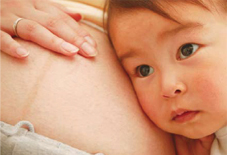As a pregnant mum of a preschooler, you need to care for your pregnancy and meet the demands of your little preschooler. A reality that is often overlooked is your susceptibility to getting infections from your preschooler due to his exposure at school. Preventive measures are necessary during this time to prevent harmful effects of these infections on your unborn child.
Mild Infections
Upper Respiratory Tract Infections (URTI) are highly contagious as the infection-causing viruses are airborne. The cold and the flu are amongst the most common examples of URTI. While these infections do not cause much harm to the pregnant woman, some viruses have been found to cause miscarriages or birth defects in the unborn baby.
Skin diseases and parasites such as scabies and body lice can also spread easily from child to mother through physical contact. Scabies are caused by mites that burrow under the top layer of the skin, causing severe itching and tiny red marks on the skin. Lice are parasites that feed on human blood. They are commonly spread through head-tohead contact, or through the sharing of combs, brushes or hats.
Serious Infections
Chicken pox is an infection of the highly contagious Varicella virus, commonly spread by inhalation and touch. You are at risk of being infected if your preschooler catches it from another child at school. Pregnant women infected with chicken pox put their unborn babies at risk of birth defects. Therefore, you should be vaccinated against chicken pox before getting pregnant if you have not been infected in the past. This is especially necessary when your preschooler does not have any history of chicken pox infection.
Rubella commonly spreads through touch and close contact, especially in a closed environment such as a preschool. Symptoms of this infection include low fever, flu-like symptoms, swollen lymph nodes, and a rash. As the symptoms are mild, your preschooler may be infected without anyone realising it, thus risk passing it on to you. With rubella being a major cause of birth defects in the unborn child, you should be tested for immunity to rubella before pregnancy. If no immunity is found, then rubella vaccine should be administered.
Measles is highly infectious as it spreads through droplets and close contact. Symptoms include tiny spots in the mouth, a red spotty rash on the skin, fever, cough and red eyes. Pregnant women who contract measles risk passing the infection to the unborn child, may experience a miscarriage, early delivery or even deliver a stillborn baby. If you have not had measles in the past, you should be vaccinated against it before getting pregnant.
Prevent Infections
- Keep yourself and your family healthy.
- Consult your doctor on the appropriate vaccines before getting pregnant.
- Wash your hands frequently with soap and water.
- As viruses can spread through your child’s saliva and urine, avoid sharing utensils with your child even if there are no signs of him having an infection.
- Avoid contact with people who have infections, even the common cold.







Comments